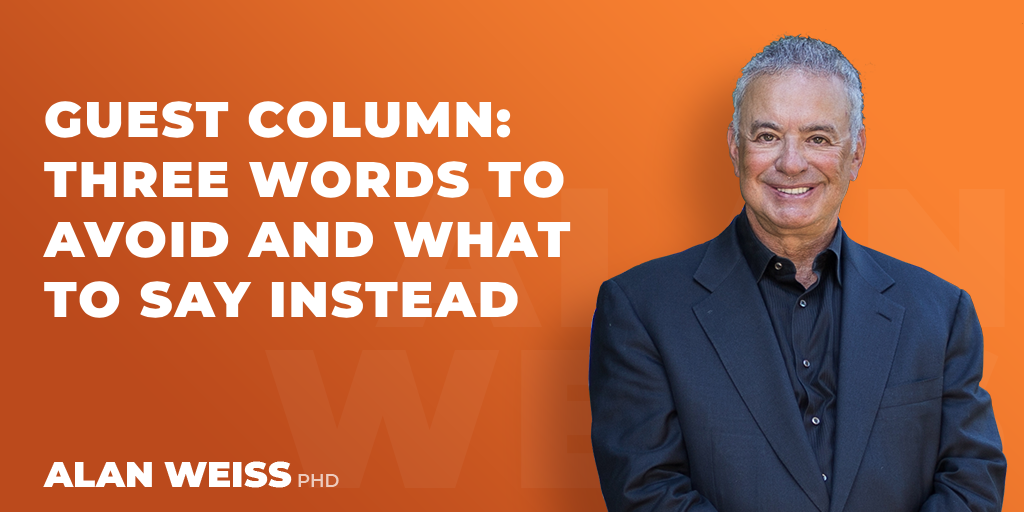
Guest Column: Three Words to Avoid and What to Say Instead
By Karen Laos
There are many words we use by habit that take away from our credibility. Most of the time we don’t even realize we’re using them.
Want to see if you do? More importantly, what to say instead?
Here they are:
- “I.”
A few times a week, I endure a rigorous cycling class where all I want is a decent workout. As a communication junkie, what I notice a lot is the use of “I” language.
When we’re giving direction or delivering a message of influence, this is not the time to use “I” language. That is a time to focus on your listeners and what they need. They don’t care about what YOU need.
Allow me to explain. The instructors will say things like: “I want you to spin faster,” or “I need you to push yourself for one more minute,” or “I want you to think about why you came here today!” And while it’s all said with great enthusiasm—and sometimes to the tune of Beyonce’ or Rihanna in the background—it misses the mark.
Notice how eliminating the “I” part makes it a much stronger message that has its audience in mind: “Spin faster!” “Push yourself for one more minute!” “Think about why you came here today!” Now we’re talking. It’s about me, making it more relevant and influential, with a much greater chance of inspiring me to do it.
It’s also important to avoid “I” language so you come across with more credibility. “I” language softens our message and takes away from the impact you could have.
At your next meeting, instead of using phrases like,”I think this will increase our business,” or “I believe this will make a difference to our bottom line,” say, instead: “This will increase our business,” or “This will make a difference” and have supporting benefits and action items to back it up.
Remember: make it about your audience. You’ll increase your credibility and deliver a powerful message of influence.
- “But”
We’ve all heard of the effectiveness of the “Yes, and…” concept from improv…because it works! Moving an idea forward using “and” instead of “but” is much more collaborative and inviting.
As soon as we hear the word, “but” it negates everything that was said before it. It’s a small word with a tremendous amount of negative power. See if you can eliminate this word from your vocabulary.
Hot tip: sometimes replacing “but” with “and” doesn’t always work, but putting a period at the end of the sentence and then starting a new sentence works fabulously.
For example, “I know we had talked about a salary increase last year. While we don’t have budget for that, what we will do is.…” instead of “I know we had talked about a salary increase last year, but we don’t have budget for it.”
Who wants to hear that? As human beings, we want options. We want to know what we CAN do. Focus on that as you move your ideas forward.
- “Kinda, sorta, maybe”
These words are in the same camp because they’re all modifiers and value-diminishers. They make us sound unsure and tentative, the opposite of confident.
You’d be surprised at the amount of people who use one or all of these words. They sneak up on you and sometimes we don’t even notice them.
Think of an economy of words. If every word cost us $20, we’d think about each one with much more intention. You want to be concise and share value in each word. Taking these out will help you do that.
BONUS tip: Avoid the phrase, “Does that make sense?”
There’s nothing like negating your own credibility when you ask if something made sense. When you ask this, it can look as if you weren’t sure yourself if you made sense, and this takes away from your confidence.
Instead, ask, “How did that land for you?” or “How was that helpful?” or “What questions do you have?” That way, you’ll also get a more robust answer than what a closed-answered question would give you.
One other effect of saying this is that it can be perceived by the audience as if they’re not capable of understanding and that could come across as patronizing.
Most of us aren’t thinking about every word we use. It’s not a big deal if you use some of these words once in a while. The problem is when they become a habit and erode our credibility without us even being aware.
You’re familiar with filler words such as “um” and “ah.” There are many other perfectly good words that when overused become like another “um.” Words such as, “like,” “right,” “actually,” and “literally.” Work to avoid these in excess, too.
This all rolls up to one main idea: Speak with intention if you want to influence and make a meaningful impact. Use these tips to communicate more effectively and come across with confidence.
One action I would recommend to increase your communication effectiveness: Record yourself so you can hear (and see) how you sound. The best way to identify your blind spots is through objective feedback in a video or audio recording.
Most of my clients initially hate the idea of video, but once they get a taste of how quickly it elevates their communication game, they want more.
In the meantime, cheers to avoiding these words and increasing your confidence (and impact) instead.
© Karen Laos Consulting LLC.
Karen is a professional speaker with rave reviews from NASA, Google, Netflix and UnitedHealthcare. She’s on a mission to help 10 million women overcome self-doubt and speak with confidence. Her podcast is called Ignite Your Confidence. You can reach her at www.karenlaos.com or https://www.linkedin.com/in/karenlaos/



